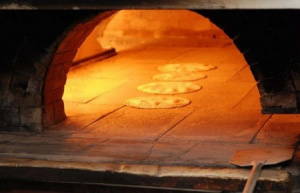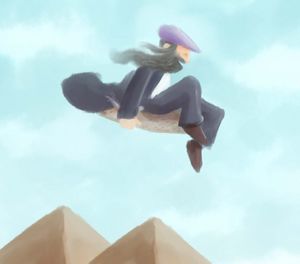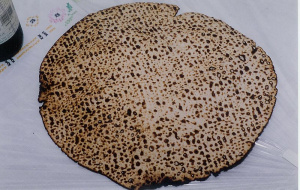Eating Matzah



The mitzvah of eating matzah is an obligation on the Seder night, the first night of Pesach, to eat at least a k'zayis (olive-sized portion) of matzah. The mitzvah commemorates the matzos that the Children of Israel ate when they left Mitzrayim (Egypt).
Source of the Mitzvah[edit | edit source]
It is a positive commandment from the Torah to eat matzah on the night of the 15th of Nissan, which is the Seder night, as the verse states:
"On the first [day] on the fourteenth day of the month in the evening, you shall eat matzos" — Shemos 12:18
The obligation to eat matzah is mentioned in additional places in the Torah: "In the second month, on the fourteenth day, at dusk, they shall make it; with matzos and bitter herbs shall they eat it" (from this verse we learn that the Pesach offering must be eaten together with matzos and maror). "You shall not eat leaven with it; for seven days you shall eat with it matzos, the bread of affliction, for in haste you went out of the land of Mitzrayim, so that you shall remember the day of your departure from the land of Mitzrayim all the days of your life[1]."
However, the main obligation is learned from the verse "in the evening, you shall eat matzos[2]."
Reasons for the Commandment[edit | edit source]
One of the central reasons for eating matzah on Passover is to commemorate the haste of the Exodus from Egypt. As it is stated: "they baked the dough which they had brought out of Egypt into unleavened cakes, for it had not leavened, because they were driven out of Egypt and could not delay"[3]. Similarly, it is written: "Seven days you shall eat unleavened bread with it... so that you may remember the day you came out of the land of Egypt... for you departed from the land of Egypt in haste"[4].
Accordingly, the eating of matzah represents the fact that at the time of the Exodus, our ancestors’ dough did not have time to leaven, and they were compelled to bake it as it was—matzah[5].
Although the primary reason for eating matzah is because the dough of the Israelites did not have time to rise when they left Egypt, the Torah commanded the eating of matzah even earlier. Already in the passage of "This month shall be for you"[6], it is stated: "They shall eat the meat on that night, roasted over fire, and matzot; with bitter herbs they shall eat it," and explicitly: "In the evening, you shall eat matzot." Thus, the commandment to eat matzah preceded the actual event of the hasty departure.
This requires explanation: if the main rationale for eating matzah is that the dough of our ancestors did not leaven until God revealed Himself and redeemed them, as stated, "They baked the dough into unleavened cakes... because they were driven out of Egypt and could not delay,"—how is it possible that the commandment to eat matzah was given before the Exodus itself, in the passage of "This month shall be for you", before the event of the hasty redemption had occurred?
On this matter, three explanations have been given:
First explanation: The original command, "In the evening, you shall eat matzot," refers only to the first Passover night, when the Israelites were commanded to eat the Paschal offering together with matzah and bitter herbs. By contrast, the eating of matzah during the remaining seven days of Passover stems from the historical event in which the Israelites were forced to leave in haste and therefore baked matzot, as their dough had no time to rise. In other words, the matzah of the first night is due to a divine commandment, whereas the matzah of the subsequent days serves as a memorial to the event.
Second explanation: A distinction should be made between two types of matzah: matzah eaten before midnight and matzah eaten afterward. Before midnight, it was consumed in fulfillment of God's command as part of the Paschal offering. After midnight, when God revealed Himself and redeemed Israel, their dough did not have time to rise—this gave rise to the "matzah of haste." The commandment we fulfill today, even when we eat matzah before midnight on the Seder night, incorporates both aspects: both the matzah commanded by the Torah and the matzah symbolizing the haste of the redemption.
Third explanation—and the simplest: Although the commandment to eat matzah was issued before the actual Exodus occurred, this was because God, who knows the future ("declaring the end from the beginning"), knew in advance that the redemption would come in haste and the dough would not have time to leaven. Therefore, He commanded them to eat matzah so that their eating would be not only in response to circumstance but also in fulfillment of a divine precept. For had they eaten matzah merely because their dough had not leavened, it would not have constituted a commandment. Thus, God preemptively issued the command so that what was done under duress (due to the haste of redemption) would also be performed intentionally as a mitzvah[7].
During Galus (Exile)[edit | edit source]
During galus when we are unable to offer the Pesach sacrifice, there is a dispute in the Gemara whether the mitzvah is from the Torah. However, in halacha, the Gemara follows Rava's opinion that the obligation is from the Torah even during galus:
Rava said: "Matzah nowadays is a Torah obligation, while maror is rabbinic. Why is maror different? Because it is written, 'with matzos and maror shall they eat it' - when there is a Pesach offering, there is [an obligation of] maror, and when there is no Pesach offering, there is no [Torah obligation of] maror. But regarding matzah as well, isn't it written 'with matzos and maror shall they eat it'? [For] matzah, the verse returns to it [to obligate it independently], [as it states] 'in the evening you shall eat matzos.' And Rav Acha bar Yaakov says both this [matzah] and that [maror] are rabbinic...A beraisa supports Rava: 'Six days you shall eat matzos, and on the seventh day shall be a solemn assembly to Hashem your G-d' - just as [eating matzah on] the seventh day is optional, so too [on] the six days it is optional... One might think that [eating matzah] on the first night is also optional; the verse therefore states 'with matzos and maror shall they eat it.' I only know [that the obligation applies] when the Beis HaMikdash exists; from where [do I know that it applies] when the Beis HaMikdash does not exist? The verse therefore states: 'in the evening you shall eat matzos' - the verse established it as an obligation." — Pesachim 120a
This means that the Torah emphasizes that although both for matzah and maror it says "with matzos and maror shall they eat it," regarding matzah the Torah emphasizes "in the evening you shall eat matzos," indicating that even when there is no Pesach offering, there is an obligation to eat matzah.
However, on the other days of Pesach, despite the prohibition of eating chametz, there is no obligation to eat matzah specifically, as our Sages interpret "just as [eating matzah on] the seventh day is optional, so too [on] the six days it is optional."
Women and the Mitzvah[edit | edit source]
Despite this being a time-bound positive commandment from which women are typically exempt, in this mitzvah both men and women are obligated because the Torah connects the prohibition of eating chametz to the commandment of eating matzah in the verse: "You shall not eat leaven with it; for seven days you shall eat with it matzos." Our Sages expounded: "Whoever is included in the prohibition of 'do not eat chametz' is included in the positive commandment of 'eat matzah,' and since women are included in the prohibition against eating chametz, they are included in the positive commandment to eat matzah."
Tosafos gives an additional reason to obligate women in the mitzvah of matzah: that they too were under Pharaoh's decrees, which is the same reason for their obligation in the mitzvos of Purim. However, they explain that the obligation from this reasoning alone would only be rabbinic, while their obligation in matzah is from the Torah. Alternatively, from this reasoning alone we would not have known their obligation because there is a gezeirah shavah (textual comparison) from Sukkos to Pesach, and we would have exempted them based on this comparison (as women are exempt from the mitzvah of sukkah). Therefore, a special teaching is needed to obligate women in the mitzvah of matzah.
Its Innovation[edit | edit source]
Seemingly, there is an obligation on every Yom Tov to eat bread, and if so, on Pesach, when the Torah forbade eating chametz bread - automatically there would be an obligation to eat matzah. So what is the innovation in this mitzvah?
The Ran explained that its requirement is specifically "lechem oni" (bread of affliction). And in the Shulchan Aruch of the Alter Rebbe, it is explained that the obligation to eat bread on Yom Tov is rabbinic, and on the first night of Pesach according to all opinions it is rabbinic. Thus, the Torah innovated an obligation to eat bread on the first night of Pesach (and the first night of Sukkos is learned from Pesach).
How to Fulfill the Mitzvah[edit | edit source]
The first k'zayis of matzah must be eaten while reclining - sitting inclined on one's left side, and if one ate without reclining, one must eat it again with reclining. Ideally, one should put both "k'zeisim" in one's mouth simultaneously (the one for the blessing of "Hamotzi" and the one for the blessing of "Al Achilas Matzah"), and swallow one complete k'zayis and then another k'zayis, so that there won't be an interruption between the blessing of "Al Achilas Matzah" and eating the k'zayis associated with it (as there is a dispute whether the blessing of "Al Achilas Matzah" relates to the broken matzah and the blessing of "Hamotzi" to the whole one, or vice versa). But after the fact, this does not invalidate [the mitzvah]. Although it should be noted that with today's matzos, this is not so feasible.
See Also[edit | edit source]
External Links[edit | edit source]
- Rabbi Adin Steinsaltz, Why Do We Eat Matzah?
References[edit | edit source]
- ↑ Bamidbar 9:11
- ↑ See Rambam Hilchos Chametz U'Matzah Chapter 6 Halacha 1 and in the Lechem Mishneh there, and in the citation of the Gemara later in the text.
- ↑ Exodus 12:39.
- ↑ Deuteronomy 16:3.
- ↑ They brought out dough from Egypt, and baked it into matzot when they arrived at Sukkot; and from the time they left Raamses until they came to Sukkot, the dough did not leaven. Likkutei Torah
- ↑ Exodus 12.
- ↑ Maamar "Matzah Zo" 5629, Sefer HaMaamarim 5629, p. 132ff; and Maamar "Matzah Zo" 5729.
